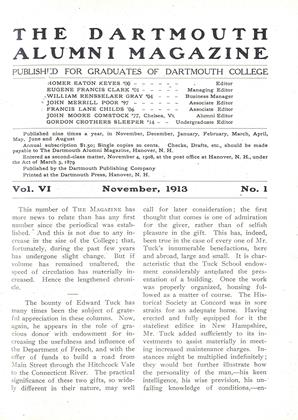more news to relate than has any first number since the periodical was established. And this is not due to any increase in the size of the College; that, fortunately, during the past few years has undergone slight change.' But if volume has remained unaltered, the speed of circulation has materially increased. Hence the lengthened chronicle.
The bounty of Edward Tuck has many times been the subject of grateful appreciation in these columns. Now, again, he appears in the role of gracious donor' with endowment for increasing the usefulness and influence of the Department of French, and with the offer of funds to build a road from Main Street through the Hitchcock Vale to the Connecticut River. The practical significance of these two gifts, so widely different in their nature, may well call for later consideration; the first thought that comes is one of admiration for the giver, rather than of selfish pleasure in the gift. This has, indeed, been true in the case of every one of Mr. Tuck's innumerable benefactions, here and abroad, large and small. It is characteristic that the Tuck School endow- ment considerably antedated the presentation of a building. Once the work was properly organized, housing followed as a matter of course. The Historical Society at Concord was in sore straits for an adequate home. Having erected and fully equipped for it the stateliest edifice in New Hampshire, Mr. Tuck added sufficiently to its investments to assist materially in meet- ing increased maintenance charges. Instances might be multiplied indefinitely; they would but further illustrate how the personality of the man,— his keen intelligence, his wise prevision, his unfailing knowledge of conditions,— enriche's his every benefaction and dominates the imagination of the recipients of his favors.
Richer in material things, the College is poorer in the loss of two of her sons, whom long and intimate association and brilliant services had rendered very dear. "Mother of men", Dartmouth could have found no surer evidence of right to the title than in John Robie Eastman and Charles Francis Richardson. Eloquent tributes to their qualities have been spoken and are here recorded. But no garlands of praise can fill the void occasioned by their taking; no monuments of polished rhetoric supply their distinguished presence. They are gone; the realization touches emotions too profound for expression and memories too deep for tears.
This is a bad time to attempt football prophecy. The immediate hour is in the far advanced p. m.'s; the date is October 22. The Dartmouth eleven has defeated a succession of rivals, the last of whom, Williams, had been a source of considerable dread. Between now and mailing time Princeton and Amherst will have been encountered, and the season's history fairly outlined. Suffice it, then, to say that this year's football team shows signs of better handling than that of a year ago. It is more alert; more expert in fundamentals ; more coherent in action than was last year's team at the same date. Indications of nervousness and overwork, increasingly apparent as the previous season advanced, are now entirely absent. Coaching and training are unusually well adjusted one to the other. The promise is good. In view of the lightness of available material, it is doubtless fortunate that Dartmouth will not this year encounter Harvard. In other fields, the Green should better than hold its own.
To the perseverance of Weld A. Rollins, of the Class of '97, the alumni owe admiration, adulation, and, above all, a song. Mr. Rollins justly feels that the catalogue of Dartmouth songs that alumni can sing is rather pitifully limited. Aside from, the time-honored, but far from distinguished, ''Come, fellows, let us raise a song", there is scarcely one melodious ditty of the College that men can sing together. There are "football songs", to be sure,, dozens of them, made to be bellowed through megaphones, proof against the shocks of limping metre and tortured rhyme. But such contributions to the noise of nations hardly counts. There is a lack of campus songs, of songs of Dartmouth fellowship, and loyalty. Mr. Rollins proposes to supply this lack. During two years he offered $100 for an under graduate production; but nothing suitable was offered. Now he opens opportunity to alumni, friends, and friends of friends. The committee has not thus far been deluged with contributions. It is therefore urged that poets and musicians forthwith strike their lyres and seek the stirrings of divine afflatus.
Attention of the alumni is called to the fact that the Dartmouth headquarters in Philadelphia on November 7 and 8 will be the Bellevue-Stratford Hotel. Here the Alumni Council will meet on Friday and Saturday. An account of this meeting will be printed in the December MAGAZINE,
 View Full Issue
View Full Issue
More From This Issue
-
 Article
ArticleA LOSS TO THE COLLEGE
November 1913 -
 Article
ArticleTHE CHEMICAL LABORATORY
November 1913 By Edwin J. Bartlett -
 Article
ArticleADDRESS TO THE STUDENTS AT THE OPENING OF COLLEGE SEPTEMBER 18, 1913
November 1913 By Ernest Fox Nichols -
 Class Notes
Class NotesLOCAL ASSOCIATIONS
November 1913 -
 Article
ArticleMR. JOHNSON'S GIFTS TO THE OUTING CLUB
November 1913 -
 Class Notes
Class NotesCLASS OF 1862
November 1913 By Luther W. Emerson
Article
-
 Article
ArticlePRESIDENT HOPKINS
April, 1925 -
 Article
ArticleFELLOWSHIPS AWARDED FOR GRADUATE STUDY
APRIL 1928 -
 Article
ArticleA flurry of films
SEPTEMBER 1984 -
 Article
Article1892
May 1939 By ARTHUR M. STRONG -
 Article
ArticleBasketball
January 1957 By CLIFF JORDAN '45 -
 Article
ArticleGetting Ahead on the Mommytrack
OCTOBER 1990 By Debbie Schupack '84


